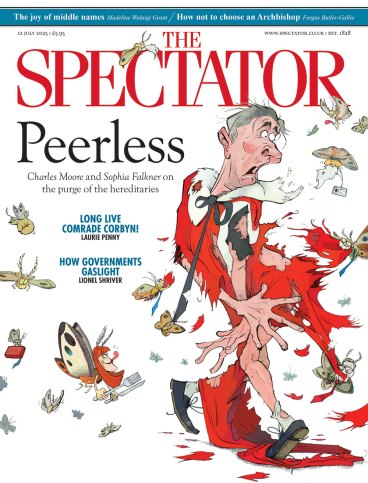
Norman Tebbit, who died this week aged 94, was a self-made man who shouldered his way to the top of a party of old Etonians. He was, to many, the leather-clad bovver boy of Spitting Image, ordering the unemployed to get ‘on yer bike’. He was a devoted husband who stepped back from politics to care for his wife, Margaret, after they were pulled from the wreckage of Brighton’s Grand Hotel. And he was an unrepentant right-winger, who was unflinching about where his party had gone wrong, and unforgiving to the monsters who had put his wife in a wheelchair.
This Middlesex grammar school boy turned airline pilot, turned cabinet minister, changed the country he loved for the better. As a secretary of state he played a crucial role in curbing the powers of the trade unions; as Conservative party chairman he delivered Margaret Thatcher’s third, crushing election victory; as a backbencher and peer, he was a campaigner for Brexit far earlier,
and far more enthusiastically, than most.
More than anything, Tebbit was the symbol of an age – a man who embodied the turbulent, consensus-busting 1980s, perhaps even better than the Prime Minister whom he assiduously served.
There were times when Tebbit seemed to be too blunt for liberal Tory tastes. As Dominic Lawson, our former editor, records in his article, this magazine was critical of Tebbit when he proposed his ‘cricket test’. He had suggested that whether people from ethnic minorities supported England or the country of their ancestors was an effective test of integration. We said then that Tebbit, who was on the board of this magazine at the time, was ‘in danger of confusing Yobbo chauvinism with citizenship’.
It is a measure of Tebbit’s own integrity that he applauded Lawson for demonstrating admirable editorial independence. But what has happened since has, if anything, vindicated Tebbit. He was willing to risk criticism in the interests of a more unified country. When the 7/7 bombers struck, 20 years ago this week, he claimed vindication, telling the BBC: ‘We have generated home-grown bombers; a combination of the permissive society together with a minority population deeply rooted in its own moral code.’
Tebbit felt compelled to talk openly because he knew he spoke for millions who would not otherwise be heard – those ignored or scorned by the Establishment. In the 1980s, he spoke for workers who wanted to be free from trade union intimidation and for voters exasperated that their income was going to a bloated welfare state and unproductive nationalised industries. He was the tribune of the aspirational and patriotic British working and lower-middle class; those who understood that Thatcherism offered them an alternative to managed decline.
He spoke for millions who would not otherwise be heard – those ignored or scorned by the Establishment
The labour market reforms that Tebbit introduced transformed the country’s economic prospects. Yet this was as much about morals as it was money. He argued convincingly that individuals should take responsibility for their actions. That the state has no cash of its own, only that which it takes from taxpayers. That accumulating wealth is a reward for virtue, not some form of theft. So when progressive voices, including in his own party, claimed that rioting was a natural response to unemployment, he had a reply. Tebbit is perhaps best known for telling the story of his father, who had not resorted to violence when he faced unemployment but had ‘got on his bike and looked for work’ and ‘kept looking till he found it’. It is instructive to note the contrast between the moral clarity of Tebbit’s Protestant work ethic and this government’s intellectually incoherent and fiscally incontinent plans for welfare reforms.
To remember Tebbit only for his combative instincts is to overlook his compassion. His deep hatred of Irish republicanism must be balanced with his dedication to his wife; his unshakeable opposition to Cameroon modernisation with the quiet support he offered to many young politicians; his ferocious arguments with a children’s book he wrote about a disabled boy and his dog and his cookbook that proved that the ‘Chingford Skinhead’ knew game just as well as any grouse moor grandee.
Tebbit often joins the likes of Tony Benn, Enoch Powell and Roy Jenkins on the list of great prime ministers that we never had. There is always a romance to these counter-factuals. The idea of Tebbit leading the country was all the more alluring when faced with John Major’s premiership: the appeasement of Irish republicanism, the surrender to European integration, the drift away from principle. If there was one politician who most deserved to be Thatcher’s successor, it was Tebbit. Yet his fidelity to another Margaret – the wife he adored and whose health he put first – meant a Tebbit ministry was a dream that went unfulfilled. Today’s Conservatives should remember his grit, resolve and fidelity to a clear set of beliefs.
Not everyone can be a Norman. But we can learn the lesson of his life: that there is a time for gentleness, and a time for pugnacity. Faced with another weak government that is damaging our country, now is the time for the latter.







Comments